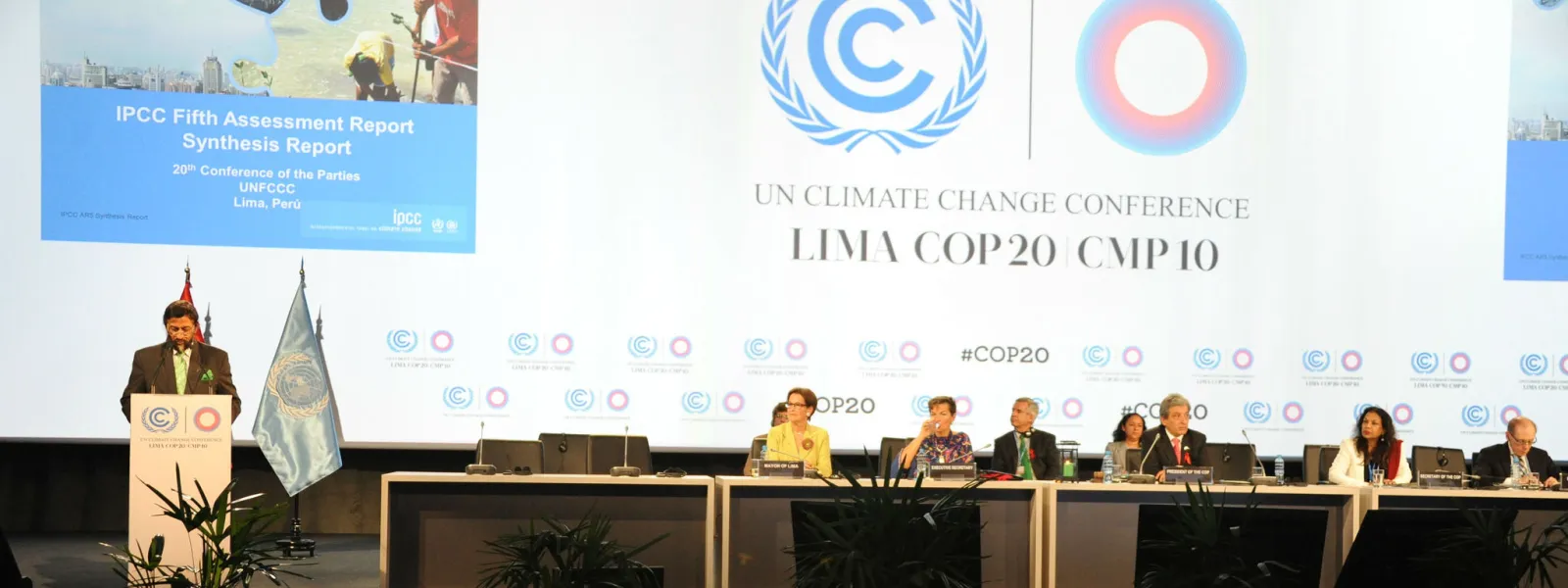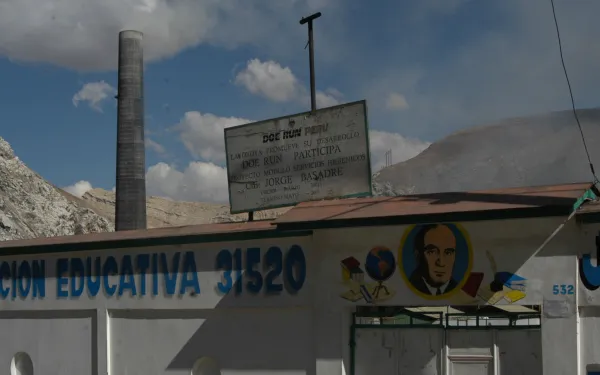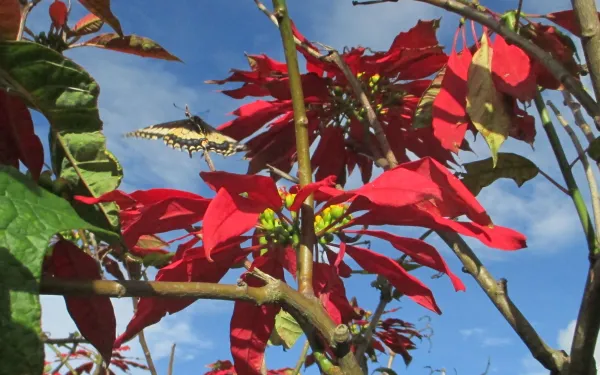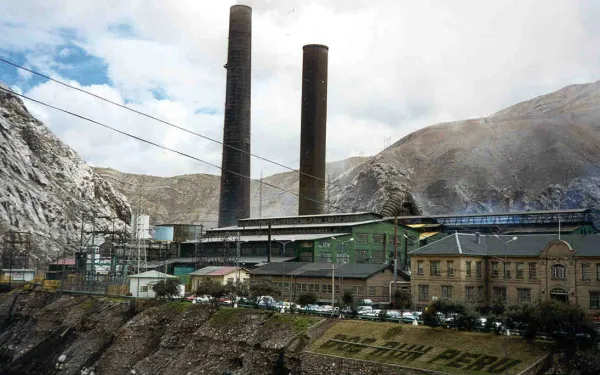
Project
Photo: UNFCCCMonitoring the UN Climate Negotiations
As changes in climate become more extreme, their affects are being hardest felt throughout developing countries. Since 1994, the United Nations Framework Convention on Climate Change has laid out actions to limit the increase of global average temperatures and confront the impacts of climate change.
The States that are Parties to the Convention meet every year in the so-called Conference of the Parties (COP) to review their commitments, the progress made in fulfilling them, and pending challenges in the global fight against the climate crisis.
At COP21 in 2015, they adopted the Paris Agreement, which seeks to strengthen the global response to the climate emergency, establishing a common framework for all countries to work on the basis of their capacities and through the presentation of Nationally Determined Contributions (NDC) that will:
- Limit the increase in global temperatures to 2°C compared to pre-industrial levels and continue efforts to limit it to 1.5°C;
- Increase the capacity of countries to adapt to the impacts of climate change; and
- Ensure that financing responds to the goal of reducing greenhouse gas emissions.
Our focus areas
THE CLIMATE CRISIS AND HUMAN RIGHTS
The climate crisis, due to its transversal character, has repercussions in various fields, geographies, contexts and people. In this regard, the Preamble to the Paris Agreement states that it is the obligation of States to "respect, promote and fulfill their respective obligations on human rights, the right to health, the rights of indigenous peoples, local communities, migrants, children, persons with disabilities and people in vulnerable situations and the right to development, as well as gender equality, the empowerment of women and intergenerational equity."
AIDA at the COP
COP25: Chile-Madrid 2019
At COP25 in Madrid, Spain, we advocated for the inclusion of the human rights perspective in various agenda items. We promoted the incorporation of broad socio-environmental safeguards in the regulation of Article 6 of the Paris Agreement, which refers to carbon markets. We closely followed the adoption of the Gender Action Plan, as well as the Santiago Network, created "to catalyze technical assistance […] in developing countries that are particularly vulnerable to the adverse affects of climate change." We also encouraged the inclusion of ambitious and measurable targets for the reduction of short-lived climate pollutants in the climate commitments of States.
Related projects

Statement from AIDA and APRODEH on the International Arbitration Ruling in La Oroya
The Peruvian government must adequately address the environmental, public health and employment situation in La Oroya. Lima, Peru. On Monday the International Center for the Settlement of Investment Disputes (ICSID) ruled in favor of the Peruvian government in a case involving the Metallurgical Complex of La Oroya. As organizations representing residents in La Oroya, the Interamerican Association for Environmental Defense (AIDA) and the Asociación Pro Derechos Humanos (APRODEH) welcome the decision, which terminates the legal proceedings against the State. The Renco Group, owner of Doe Run Peru, operator of the smelter in La Oroya, initiated arbitration after the Peruvian government claimed the company failed to comply with its environmental commitments. ICSID, a World Bank-sponsored institution, dismissed Renco’s claim due to lack of jurisdiction. While AIDA and APRODEH celebrate this positive news for the government of Peru, it is our hope that, as a result of this decision, the State concentrates its efforts on providing a sustainable solution to the vast contamination in La Oroya, and that it prioritizes the health, environment and employment situation of residents there. We also urge the government to fully comply with the precautionary measures the Inter-American Commission on Human Rights granted in 2007, and extended in 2016, in favor of a group of residents affected by the pollution. Peru also must accept its international responsibility for the human rights violations committed against the inhabitants of La Oroya in the case that is pending before the Commission. Regarding the decision, AIDA Co-Director Astrid Puentes said: “For years we have worked to dismiss the false premise that our demand for the safe and responsible operation of the Metallurgical Complex of La Oroya somehow violates the rights of workers. Doe Run Peru—or any company—can and must operate the smelter in a way that also protects and respects the basic human rights to life and health, for the workers as well as the entire population of La Oroya.”
Read more
AIDA condemns threats to environmental defenders in Tolima, Colombia
As a regional organization, we call on the Colombian government to immediately adopt measures to guarantee the life and integrity of at-risk activists. The Interamerican Association for Environmental Defense (AIDA) categorically condemns threats made against the Youth Socio-Environmental Collective of Cajamarca, Colombia (Cosajuca). On July 8, the organization—which forms part of the Environmental Committee of Cajamarca and the Network of Environmental Committees of Tolima—received a document containing death threats, only the most recent of a series of intimidations to which its members have been subject. The urgency of addressing this situation comes light of a larger problem in Colombia and across the region. In their most recent report, the international NGO Global Witness identified Colombia as the third most dangerous country in the world to be an environmental defender; 26 deaths were registered there in 2015. AIDA calls on the government of Colombia to guarantee the life, liberty and physical integrity of the members of Cosajuca. We also urge the establishment of a safe space for these environmental defenders to do their work, and a prompt investigation into the threats made against them. Freedom of expression and association are fundamental to the rule of law and a democratic society. Access to information, participation and the search for environmental justice are legitimate activities protected by the Constitution and the international legal treaties to which Colombia is a party. Cosajuca exercises those rights by promoting a popular referendum against mining contamination in the town of Cajamarca, and the department of Tolima, where large-scale gold mining operations are being planned. The harassment and murder of environmental defenders is pervasive throughout Latin America, which, according to the Global Witness report, is home to two-thirds of the world’s murdered activists and seven of the ten deadliest countries to be an environmental defender.
Read more
Peru must find a comprehensive and sustainable solution for La Oroya
We call on the President-elect of Peru to take into account, in any assessment of or decision about La Oroya, the rights of the population affected by the city’s severe pollution. La Oroya, Peru. On July 6, the President-elect of Peru, Pedro Pablo Kuczynski, visited the Metallurgical Complex of La Oroya (CMLO) and announced to its workers that it was necessary for the next Congress to approve a law to extend the deadline for liquidation of the Complex. This, he said, would give the company time to secure investors and finish the copper circuit. He also asked the workers and people of La Oroya to march on Congress to support his proposal. Reflecting on these public statements, the Asociación Pro Derechos Humanos (APRODEH) and the Interamerican Association for Environmental Defense would like to express the following: The city of La Oroya deserves the full attention of all levels and sectors of government to resolve in a comprehensive, specialized and sustainable way the demands of the population that, at various times in its history, has suffered, and continues to suffer, violations of their basic human rights, including the right to life, health, integrity, work and a healthy environment. Regarding the right to work, La Oroya requires a deep assessment that permits the State to propose and implement not only remedial actions, but also actions that will guarantee decent and lasting work that will sustain adequate living conditions for the entire population. No action can resolve the underlying problem in La Oroya if it does not provide a guarantee of public health for residents. In that regard, we would like to remind the President-elect that since 2007 a group of residents from La Oroya have been the beneficiaries of precautionary measures granted by the Inter-American Commission on Human Rights that safeguard their life and personal integrity before the impacts of highly polluted air, soil and water. In May 2016, the Commission extended those precautionary measures to include new beneficiaries. In the corresponding resolution, the Commission stressed that harm to the health of the beneficiaries is exacerbated due to the lack of comprehensive medical care offered by the State. Its also worth noting that a case is pending before the Commission which seeks to hold the Peruvian government responsible for the violations to the population’s basic rights to life, health, and integrity—as well as to the rights of children—due to the lack of control of pollution in La Oroya and the lack of effective medical care for those affected by it. We call on the President-elect to take into account, in any evaluation or decision on La Oroya, the rights of the population affected by the pollution. This should be done responsibly and with a comprehensive vision that guarantees the rights to life, health, work, and a healthy environment. It is inconceivable to favor the development of any economic activity over the health of the people. The incoming government faces the challenge of finding a comprehensive and sustainable solution for La Oroya, one that fully respects Peru’s national and international obligations to human rights and the environment.
Read more